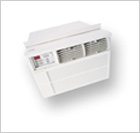|
home | bibliography | related
links
Energy Saving Room Air
Conditioning

About
Room Air Conditioning Efficiency:
An
average air conditioned home consumes more than 2000 kilowatt-hours of
electricity per year for cooling, causing about 3,500 pounds of carbon
dioxide and 31 pounds of sulfur dioxide to be emitted by the power plant. At
average electricity prices, that costs about $150. A high-efficiency A/C
unit can reduce energy consumption (and environmental emissions) by 20% to
50%. The most efficient air conditioners on the market are up to 70% more
efficient than the current average room air conditioner.
Tips for Lowering Your
Room Air Conditioner Energy Usage:
-
While fans cannot replace air conditioners, they can provide supplemental
cooling, especially on mild summer days. Substituting fans for air
conditioners can reduce energy use by 60% or more.
-
Consider installing a programmable thermostat if you do not have one. You
can save as much as 10% on your cooling bill by simply turning your
thermostat back 10 to 15 degrees for 8 hours. You can do this easily using
a programmable or a setback thermostat.
-
Set your thermostat as high as comfortably possible in the summer. The
less difference between the indoor and outdoor temperatures, the lower
your overall cooling bill will be.
-
Don't set your thermostat at a colder setting than normal when you turn on
your air conditioner. It will not cool your home any faster and could
result in excessive cooling and, therefore, unnecessary expense.
-
Room air conditioners must be installed on a flat, even surface so that
the inside drainage system and other mechanisms operate efficiently.
-
Set the fan speed on high, except on very humid days. When humidity is
high, set the fan speed on low for more comfort. The low speed on humid
days will make for a more comfortable home by removing more moisture from
the air.
-
Consider using an interior fan in conjunction with your window air
conditioner to spread the cooled air more effectively through your home
without greatly increasing electricity use.
-
Don't place lamps or televisions near your air-conditioning thermostat.
The thermostat senses heat from these appliances, which can cause the air
conditioner to run longer than necessary.
-
It is important to install the unit in a shaded spot on the home's north
or east side because direct sunshine on the unit's outdoor heat exchanger
decreases efficiency.
-
Plant trees and shrubs to shade air-conditioning units but do not block
the air flow. A unit operating in the shade uses as much as 10% less
electricity than the same one operating in the sun.
-
Room air conditioners should be covered or removed and stored in winter.
-
Check your unit's air filter once a month and clean or replace filters as
necessary. Keeping the filter clean can lower your air conditioner's
energy consumption by 5% to 15%.
-
Clogged drain channels prevent a unit from reducing humidity, and the
resulting excess moisture may discolor walls or carpet. Channels usually
can be cleared by passing a stiff wire through them.
-
Holes in the seal between the air conditioner and the window frame allow
cool air to escape from your home. Moisture can damage this seal, so
inspect the seal annually to ensure it makes contact with the unit's metal
case.
Tips for Buying
a New
Room Air Conditioner:
-
When shopping for an air conditioner, first determine which type of system
best suits your needs- central air conditioning or room air conditioning.
Central air conditioners are designed to cool an entire house, while room
air conditioners are usually window- or wall-mounted units that only cool
the immediate area.
-
Three types of room air conditioners are available: (1) window models that
can be installed in most double-hung windows; (2) casement window models
that are used in narrow, vertical windows, usually requiring the removal
of a window panel for installation; and (3) built-in models that are
encased in a sleeve installed in the wall.
-
Proper sizing is very important for efficient air conditioning. A bigger
unit is not necessarily better because a unit that is too large will not
cool an area uniformly. A small unit running for an extended period
operates more efficiently and is more effective at dehumidifying than a
large unit that cycles on and off too frequently.
-
When determining the appropriate size air conditioner for your home,
consider the dimensions of the area to be cooled. Based on size alone, an
air conditioner generally needs 20 Btu for each square foot of living
space. Other important factors to consider when selecting an air
conditioner are room height, local climate, shading, window size, etc.
-
Verify that your home's electrical system can meet the unit's power
requirements. Room units operate on 115-volt or 230-volt circuits. The
standard household receptacle is a connection for a 115-volt branch
circuit. Large room units rated at 115 volts may require a dedicated
circuit and room units rated at 230 volts may require a special circuit.
-
If you are mounting your air conditioner near the corner of a room, look
for a unit with an airflow in the desired direction for your room layout.
-
Look for a unit whose filter slides out easily for regular cleaning.
-
Select a unit with logically arranged controls, a digital readout for the
thermostat setting, and a built-in timer.
-
When considering several comparable units, select the unit with the higher
EER.
-
If you need to mount the air conditioner at the narrow end of a long room,
then look for a fan control known as "Power Thrust" or "Super Thrust" that
sends the cooled air farther into the room
U.S. EPA's ENERGY STAR Program,
http://www.energystar.gov
and the Los Angeles Department of Water and Powerer
|


